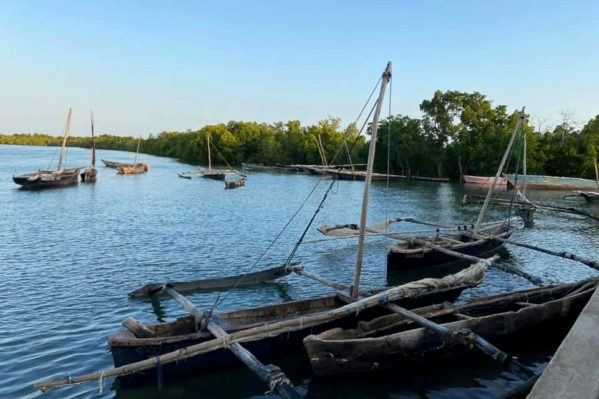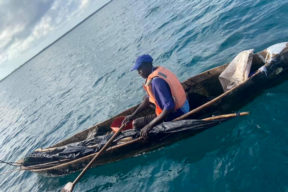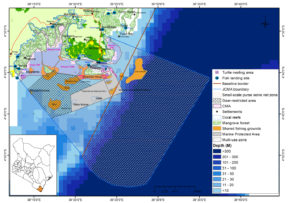By Yvonne Muyia
It’s a bright Saturday morning and I am sitting on my balcony observing how beautiful it is outside. Not too hot, not too cold, with just about enough sunlight. I am reflecting on how my week has been; I spent the last few days having interactive sessions with community members from the Shimoni-Vanga seascape in Kwale County, Kenya.
This seascape is home to about 18,000 people, a majority of whom depend on fisheries as their main source of income and food security.This seascape is home to about 18,000 people, a majority of whom depend on fisheries as their main source of income and food security. The seascape comprises seven villages, each with a community conservation area (CCA) operating under a Beach Management Unit (BMU), which are locally led groups of fishers, fish traders, boat owners and other beach stakeholders who depend on fisheries for their livelihoods.
Here in Kenya, fisheries resources are managed through co-management arrangements between the government and BMUs, which have hugely contributed to the progression of small-scale fisheries management in the country. The participatory nature of co-management has led to the empowerment of coastal communities, but there is still more that can be done to build their management capacity.
COMRED has partnered with BMUs in the Shimoni-Vanga seascape to enhance the socio-ecological resilience of the communities who live and work thereby enabling them to protect their marine ecosystems through fisheries management plans. COMRED’s mission is to promote the sustainable use of coastal resources across Kenya by developing the conservation and knowledge of these resources, addressing sustainable urban development, building the capacity of coastal communities and providing technical assistance in project design implementation, as well as monitoring and mentoring.
This specific field visit was part of a partnership between COMRED and Blue Ventures, the main objective being to improve southern Kenyan coastal communities’ participation in marine resource management. The project involved three villages’ BMUs from the south coast area of Kwale County; Wasini, Mwandamu and Majoreni. The project began in mid-2019 after a series of project design sessions with executive committee (BMU group leaders) representatives from each BMU, Blue Ventures and COMRED. The design process identified key problems facing the BMUs and proposed solutions.
However, after the first few training sessions, elections were held in all of the BMUs of Kwale County and new executive committees were elected, meaning that our previous training progress was lost. Our team was aware that the elections were four years overdue, however they ended up being announced at short notice. We were relieved that the overdue elections took place, yet this presented a new challenge; we had an entirely new training group to bring up to speed.
We decided this was an opportunity to do things differently. We met with the entire executive committee for all three of the BMUs to restructure the project to best suit their needs. The new team seemed extremely enthusiastic about the newly restructured process.We decided this was an opportunity to do things differently. We met with the entire executive committee for all three of the BMUs to restructure the project to best suit their needs. The new team seemed extremely enthusiastic about the newly restructured process.
Not long after, COVID-19 hit, halting project plans. Thankfully, we were able to keep in touch with the BMUs over the phone and when nationwide restrictions were lifted, we met with the groups to begin the training with COVID-19 measures in place. The training sessions covered BMU areas of jurisdiction, BMU membership and the structure of executive committee roles, fisheries management measures, financial management and overall objectives.
The more I think about this particular field visit, the more impressed I am with how it went. If I compare it to the first meeting we had, there has clearly been so much growth and as I sit here on my balcony reflecting on how each BMU participated, it has all just hit me.
Majoreni BMU
All of the fishermen in the Majoreni BMU are small-scale subsistence fishers. Their members comprise not only fishers, but also fish traders, vessel owners, local gear makers, fish processors, and other coastal stakeholders.
When we arrived at the meeting, the whole group was already there, armed with printed versions of their by-laws. They had clearly taken time beforehand to go through them as a team, which they said they hadn’t always done in the past. As well as by-laws, BMUs are also guided by regulations that operate at a national level and whilst some committee members were aware of these regulation documents, none had really studied them in detail.
When we did this with the Majoreni BMU group, there were a lot of questions as many of them found them hard to read and understand the English phrases in the documents. During the meetings, we translated the phrases into Kiswahili (our national language) to make it easier for everyone to understand.
Throughout the session, the chairman Suleiman helped other members to better articulate their questions and concerns. He did this by giving relatable examples from their fisheries context – some of these were hilarious which made the session particularly interactive and enjoyable for all involved.
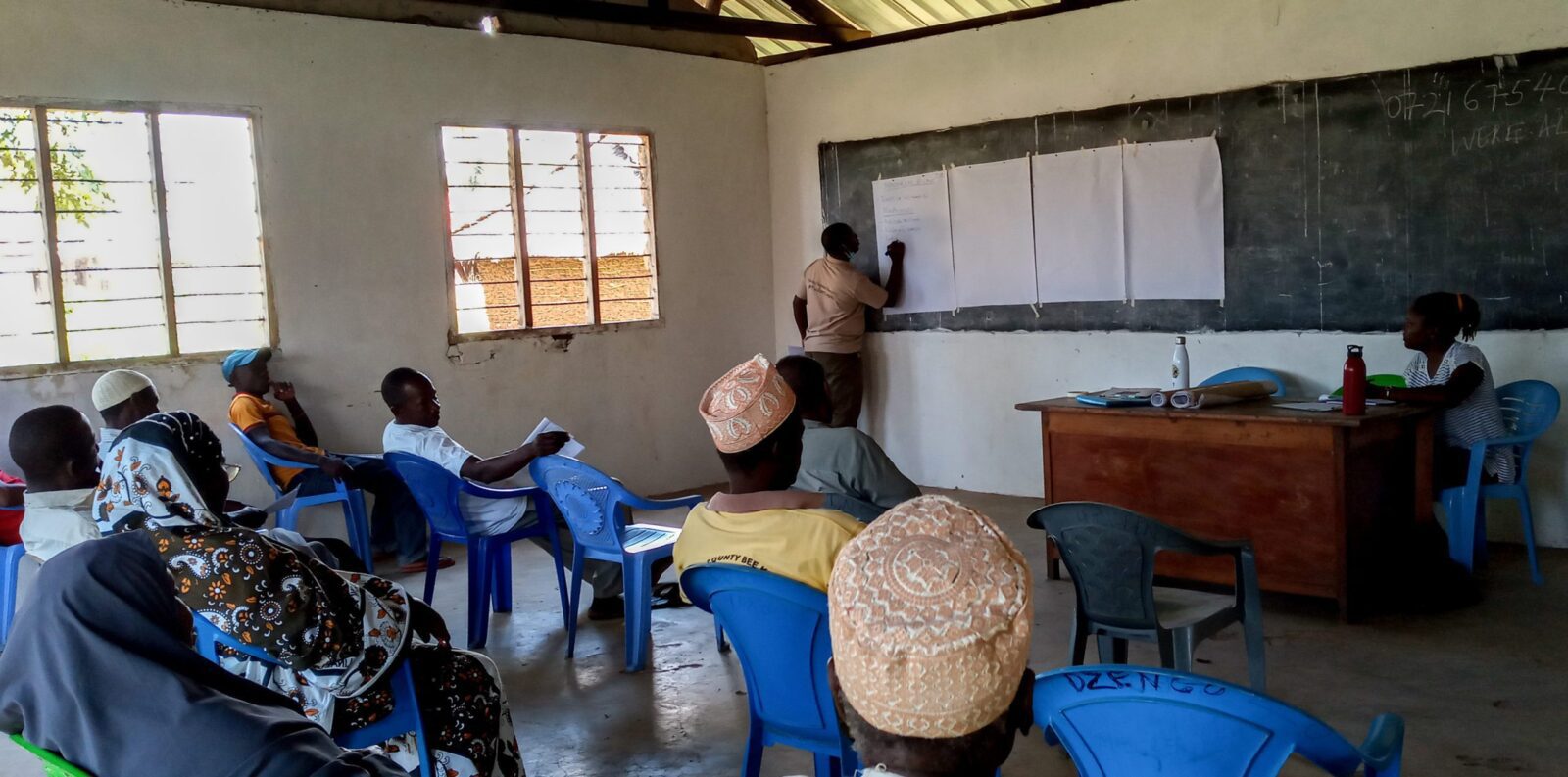
Mnyeto (seated at the front in white) explaining some of his responsibilities as the Majoreni BMU vice secretary | Photo: Yvonne Muyia, COMRED
After the session, I asked Hatibu, who is one of the few young members of the Majoreni BMU executive committee, why he thought the training was useful,
When you are a BMU secretary and you are able to understand the rules and regulations, you can articulate yourself better and have confidence in your actions. The training has also improved coordination amongst committee members, making our work so much easier – this has not always been the case.”
Wasini BMU
Ever since I started working in marine conservation, most of the BMUs I have worked with do not have young people in their leadership, but Wasini BMU’s new executive team is 90% young people in their twenties – if that is not impressive I don’t know what is! Normally, the lack of youth representation is due to a perception that the fisheries sector is not particularly lucrative, so I was curious to know what brought them on board here in Wasini. I asked a few of them and their answers were all the same – for a long time, BMU leadership was represented by a particular group of people from the same family, and the community felt it was time to change the leadership and actively involve more young people.
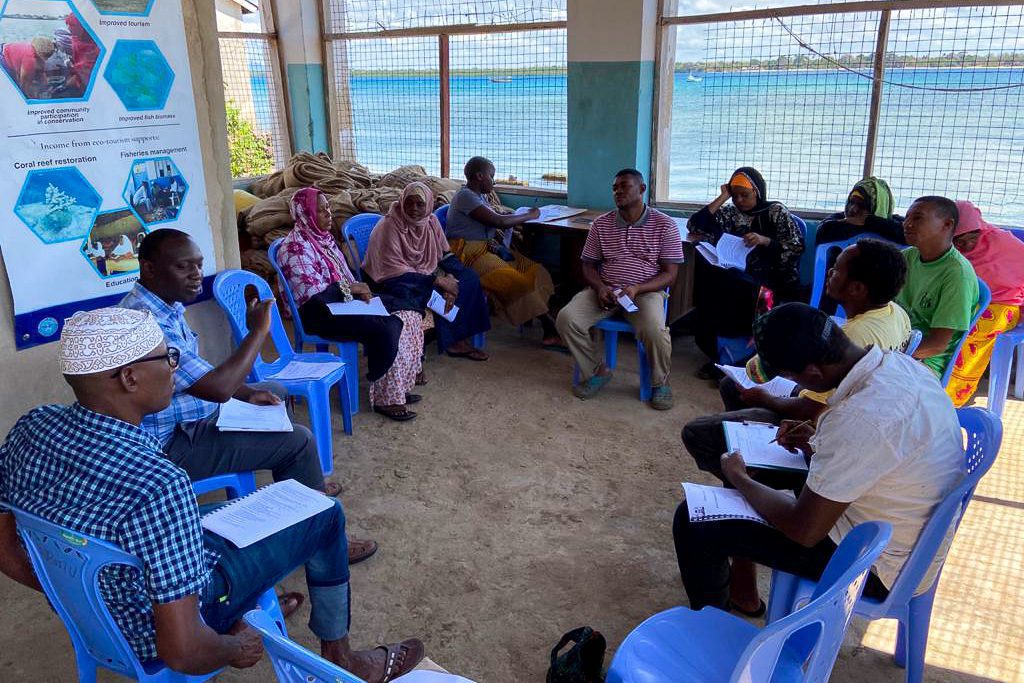
Patrick (gesturing in checked shirt) Director at COMRED, commending Wasini BMU committee members on their efforts to keep their CCA in good condition | Photo: Jane Muteti, COMRED
I learnt that most of the young women in the team are certified divers who are able to carry out coral and seagrass restoration in their CCA. In a community where women were not previously allowed to partake in conservation efforts due to ingrained gender stereotypes, the fact that they are now diving and carrying out this important restoration work is amazing! I was so impressed I wanted to book a diving session with one of them. That is of course after I become a certified diver myself…
While going through the by-laws with the committee it was obvious that most of them knew what the roles of BMUs are and why they are important to their livelihoods. After the training, I asked the team how they plan to apply what they’ve learnt in future,
Future? What do you mean, Yvonne? The moment we finished our first session we left the hall and started applying what we’d learnt. With a better understanding of our roles, we are carrying them out in a much more organised and coordinated way.” – Kassim, Secretary of the Wasini BMU
Mwandamu BMU
When we initiated the project in 2019, the Mwandamu BMU needed some extra attention because their capacity was very limited compared to the other two groups. They do not have an office to run their activities but continue to strive to effectively manage their BMU.
Their former chairperson Majaliwa was the most active member of the group, and was also acting as the secretary and treasurer – he was a great leader. Despite working alone, he single handedly managed to keep the BMU running up until the elections. Majaliwa did not want to run for office and gave others a chance.
The new 15-person strong committee seems to be serious about handling their responsibilities; they told us that they work under the hot Kenyan sun to ensure catch data is recorded at their fish landing site where the fishermen land their catch after returning from sea.
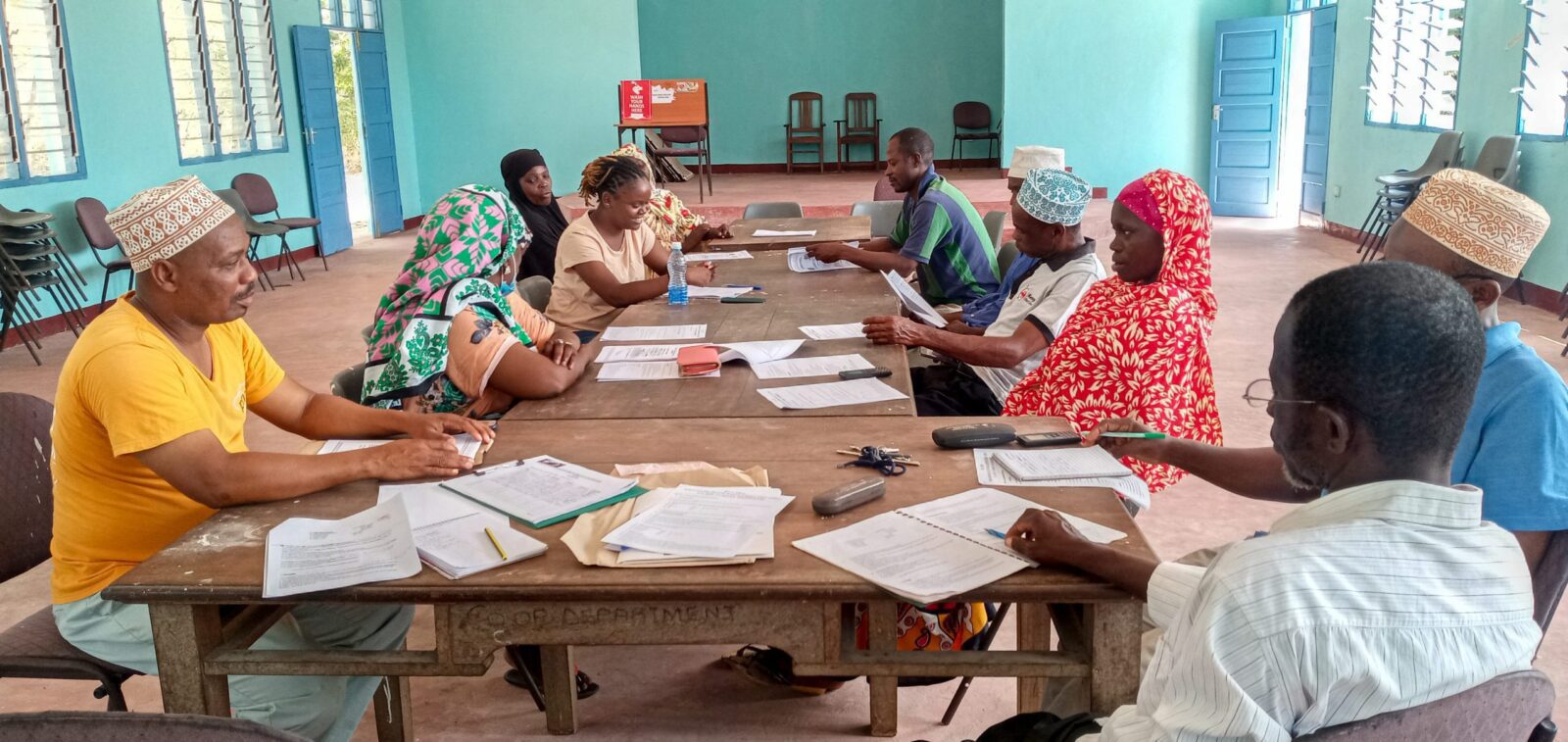
Pili (second from the left), a Mwandamu BMU committee member narrating an instance she encountered while undertaking BMU activity | Photo: Yvonne Muyia, COMRED
When we met the new team for their training session, they had printed copies of the by-laws for everyone including us, these copies were summarised and translated into Kiswahili. After seeing the extra effort they’d made, I felt so proud to be associated with them.
In the past we have not had NGOs who have shown interest in guiding us, but what COMRED and Blue Ventures are doing really makes us want to organise and implement our affairs better. Hopefully this will not be a one time project and these organisations will continue helping to build our capacity.” Bakari, Mwandamu BMU Secretary.
Some things went unnoticed at the time, but as I sit here on my balcony, I’m realising how much progress these groups have made. I was impressed by the dynamic way they communicated their concerns around their fisheries, the fact that they translated their by-laws to make them more inclusive, and also by the enthusiasm of young people to get involved in fisheries management here in Kenya.
At the end of the training, all three groups concluded that their by-laws were outdated and needed to be updated, making plans to hold meetings with the rest of the members to discuss these changes. They no longer want to wait to be told how to carry out their roles – if they see a challenge they can handle on their own, they are going to go ahead and solve it.
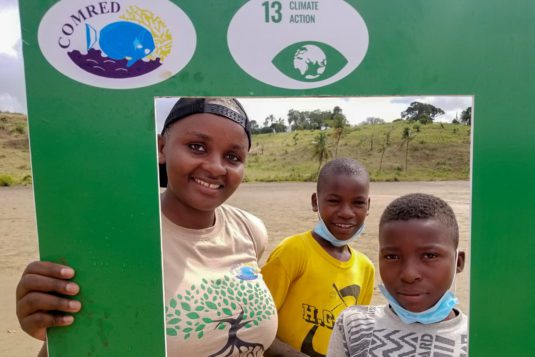
Yvonne with Sande and his friend, who Yvonne is working with as part of an ocean literacy programme for children | Photo: Tracy Kamau, COMRED
As Project Assistant at COMRED, Yvonne’s work is focused on providing assistance to governance and conservation projects.
Learn more about the COMRED team


